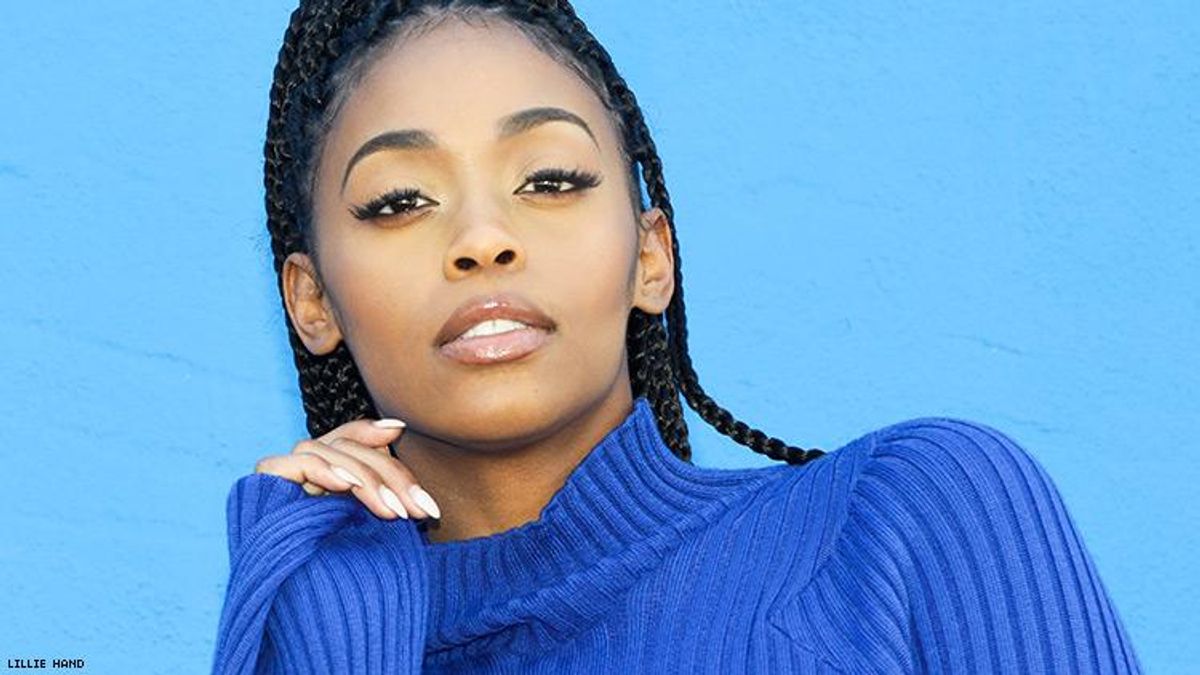Nafessa Williams learned an important lesson at San Diego Comic-Con last year: Wear flats. "There's a lot of walking around -- a lot of interaction with fans," the 28-year-old actress says of the annual pop culture extravaganza.
That bit of hard-won wisdom will come in handy. As one of the stars of The CW's Black Lightning, which last year introduced her character Anissa Pierce (a.k.a. Thunder) as television's first black lesbian superhero, she can count on many more cons in the future. And while strong female "metahumans" like Thunder routinely -- some might even say implausibly -- fight bad guys in heels, this girl from South Philly who once dreamed of becoming the female Will Smith definitely knows better.
"It was always my dream to be on television," Williams says, calling from Atlanta, where she's currently shooting Black Lightning's second season. As a child, she would keep track of her favorite shows in her school notebooks. The Cosby Show, The Fresh Prince of Bel-Air, Saved by the Bell -- those sunny sitcoms with their laugh tracks and neatly resolved conflicts were her refuge from the complicated world around her. Williams is quick to point out the parallels between South Philly and Freeland, the crime-ridden fictional city that Black Lightning (Cress Williams) and Thunder use their superpowers to protect. "The police brutality, the drugs, the murders, the poverty we see on the show -- it's all first-hand to me," she says. "That's another reason why I had to tell this story." But back then there were no superheroes onscreen who looked like Williams. Instead, Rudy Huxtable and Lisa Turtle were her idols. "I would see these beautiful brown girls on TV and be like, Wait a minute! I look like them. I can do this!"
Her desire to save the world around her initially led Williams to study criminal justice. She was on track to become a lawyer when her "aha" moment came. "I was really close to taking the LSATs and working in the DA's office, and I just didn't like it," she says. "I was like, Can you see yourself working at this law firm 20 to 30 years from now and being happy?" Shortly after, she was fired for missing work for an audition. "That's when I became my own hero, and started to follow my dreams and make them a reality."
The years that followed were full of sacrifice. Williams gave up a relationship and moved from Philadelphia to L.A., leaving her family behind. "Starting out in the industry was tough, and I went through a huge learning curve," she says. But it paid off a decade later, when she found herself taking on what she quickly discovered wasn't just a breakthrough role for her, but a groundbreaking role for
the culture.
Williams acknowledges the bittersweet nature of playing the first black lesbian superhero on TV -- in 2018. "It's about damn time," she says, "but it also excited me that the shift has happened. We all want to see ourselves. We want to turn on the television and connect to these characters. I don't think I realized what that meant before we started working on this show. I had one young woman tell me she feels normal after seeing Thunder."
In the series' first season, Anissa is already out (though not as a superhuman). Williams, who is straight, did her research, turning to friends and family members to fill in the gaps, asking them to share their experiences. "I kinda picked their brains: 'What is it like coming out? What is it like as a teenager?' " she says. "One of my cousins came out around the same age as Anissa, and her confidence and boldness really inspired me. I needed to understand what it was to be a lesbian in America today." She hopes to explore her character's personal life more in season two (which premieres October 9 ). "She put her love life on the back burner, but now that she understands how her powers work, I hope she can get out there and have a little fun and balance that with her career."
But for now, Williams's biggest focus is savoring her own newfound superpower: the ability to transform Hollywood.
"Being a black woman in this country and in this industry, I've felt that we're not seeing ourselves represented," she says. "And you know, we don't complain about it. We jump up and say, 'What do we have to do to change it?' That's what Black Lightning is. It's part of that change. It transcends race. It transcends sexuality. We're inspiring people to be who they are. There's no more complaining -- we're just taking what is ours."
Photography by Lillie Hand. Styling By Xavier Lebron. Hair: Natasha Crisp. Makeup: Khamilia Smith.
























































































